Donald J. Robertson's Blog, page 5
June 27, 2025
Stoicism and Islam
I will describe what I hope will be sufficient for you, and may God protect you from all worries. — Al-Kindi
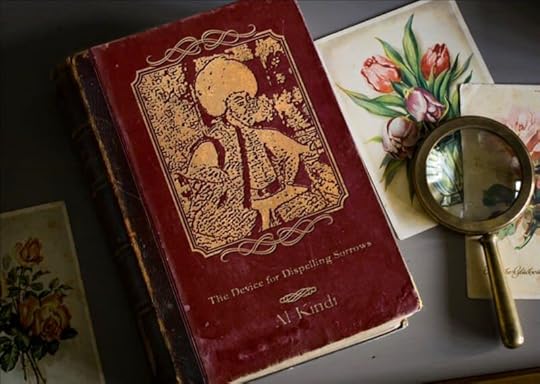 Public domain. Wikmedia Commons, modified.
Public domain. Wikmedia Commons, modified.People often ask me whether there’s any relationship between Stoic philosophy and Islam. Islam probably shares some common themes with Stoicism, as do certain strands in Jewish and Christian thought. There may also be subtle indirect influences, which are hard to trace. However, scholars believe that the writings of arab Muslim scholar Al-Kindi may provide the best example of a more direct link between Islam and Stoicism.
The Stoic school was founded in Athens in 301 BC by a Phoenician merchant called Zeno of Citium. It was always associated with Athens. However, from around the 2nd century BC interest in Stoicism began to grip Rome. We’re told of the last famous Stoic of antiquity, the Roman emperor Marcus Aurelius:
He conducted many negotiations with kings, and ratified peace with all the kings and satraps of Persia when they came to meet him. He was exceedingly beloved by all the eastern provinces, and on many, indeed, he left the imprint of philosophy. While in Egypt he conducted himself like a private citizen and a philosopher at all the stadia, temples, and in fact everywhere. — Historia Augusta
The Roman provinces being referred to here were probably Egypt, Palestine, Syria, and Cappadocia. Marcus appears to have visited some of the major cities in these regions while touring the eastern empire around 176 AD.
Indeed, during the five intervening centuries, while the Stoic school flourished, many of its most important teachers actually came from the near east, particularly the area surrounding the cities of Tarsus, in modern-day Turkey, but also Seleucia and Babylon in modern-day Iraq, Sidon and Tyre in Lebanon, and Alexandria in Egypt. We might potentially find traces of Stoic thought, therefore, among later Islamic thinkers who were born or studied philosophy at the centres of learning in these regions.
The Muslim scholar Al-Kindi has been called “The Father of Arab Philosophy”, although he was actually more of a polymath than simply a philosopher. Al-Kindi was born in Kufa in 801 AD, near the city of Baghdad where he later lived and studied. A thousand years before his time, in the 2nd century BC, two important Stoic philosophers, Diogenes of Babylon and his student, Apollodorus of Seleucia, hailed from this region. Another one of Diogenes’ students, Archedemus of Tarsus, reputedly travelled from Athens to Babylon to found a Stoic school there. It wouldn’t be surprising, therefore, to discover traces of Stoic thought in Al-Kindi’s writings. He was a prolific author and famous for helping to preserve Greek thought by introducing it to the arab world. Indeed, although he’s generally more associated with the teachings of Plato and Aristotle, one of his texts does show clear evidence of having been influenced by Stoic philosophy.
The Device for Dispelling SorrowsThe text is a consolatio type letter offering Stoic-sounding philosophical advice on overcoming life’s sorrows. He says that remedy requires diagnosis and so he begins, in typical Socratic fashion, with a definition. “Sorrow” here refers to emotional pain caused by failing to obtain what we desire, or losing what we love. This concept that emotional distress is a consequence of desire seems to be derived from the Stoic definition below, although the two aren’t identical. The early Stoics taught that desire and fear are the primary irrational emotions or passions:
Pleasure and pain supervene on these, pleasure when we achieve what we desired or escape what we were afraid of, pain when we miss achieving what we desired or meet with what we were afraid of. — Stobaeus
We find this basic premise throughout the main surviving works of Stoicism, especially The Discourses of Epictetus.
Indeed, Al-Kindi sounds very much like Epictetus when he proceeds to emphasize that this definition, of desire as the cause of sorrow, should prompt us to ask to what extent it’s possible for someone to free himself from such desires.
For it is not possible for anyone to attain all that he desires or to be safe from losing all things loved. — Al-Kindi
He concludes that loss is inevitable because nothing material is permanent, everything changes, and permanence only exists in the intellectual realm of ideas. Following Plato, Al-Kindi’s solution is therefore to love only the eternal realm of intellectual things, synonymous with the Mind of God, where nothing changes, and loss is therefore inconceivable. Eternal things are, by definition, not transitory.
As for sensory possessions, sensory objects of love and sensory desires, they are available to everyone and attainable by any hand. It is not possible to safeguard against their decay, extinction and change. — Al-Kindi
What brings consolation, in the material realm, becomes a source of sorrow when it inevitably changes and is lost, as nothing lasts forever. All material things perish eventually. When we desire material things we act as though we wish they could be grasped forever. However, this is against their very nature so we are inevitably frustrated. “Thus he who desires transitory things,” Al-Kindi concludes, “and that his acquisitions and loved objects be of them will be unhappy.”
We must learn to transpose our desires from the realm of perishable material things to the eternal realm of the divine, grasped spiritually and intellectually, as Plato would say. We should enjoy, and be grateful for, material things when they are presented to our senses, but not crave them when they’re absent. “We should not regret what we have missed”, in other words, “and should seek among sensory things only what is accessible.”
Like the Stoics, Al-Kindi, compares this inner state to true kingship. This is the noble attitude of a king: “they enjoy everything that is a present object of observation to them with the Žfirmest action, and with the clearest indication of not needing it.” By contrast, the mean-spirited crave with eager anticipation the coming of every material blessing and bid farewell to every departing one with painful sorrow. The small-minded lack gratitude and acceptance, and can neither receive nor let go of good fortune wisely. We should rather “make ourselves, by means of good habit, content with every situation so as to be always happy.”
People, he says, go to great lengths, even enduring painful medical procedures, to look after the health of their bodies. We should therefore be more willing to endure hardship for the sake of our own minds or souls. Our soul is our true nature, he says, the body merely its instrument. In language, again reminiscent of Epictetus, he says that we should train ourselves to master our desires, building habits, beginning with small things and then progressing “from the smallest to the largest issues.”
The first psychological strategy he recommends consists in dividing our sorrows into two categories, depending on whether they originate in our own actions or the actions of others. Again, this is like Stoicism but slightly different. The Stoics typically employed this general strategy of dividing things into two broad categories, for simple decision-making. Most famously, although this is not the only example, the Handbook of Epictetus begins by advising us to distinguish between things that are “up to us” and things that are not.
Al-Kindi goes on to say regarding the forms of suffering caused by our own actions that we should simply stop doing them. Nobody truly desires to suffer and we therefore involve ourselves in the contradiction of desiring something that we don’t really desire when our own actions are the main source of our sorrow. However, if the cause of our suffering has to do with the actions of another we should ask ourselves whether resolving it is up to us or not. If it is up to us then we should resolve it. If it is something that is up to another person then, at the very least, we should not allow ourselves to be sad in anticipation, before the event happens, because the other person may still resolve what is upsetting us. Moreover, we should remember that time heals all wounds: “Every sorrow is necessarily dispelled by solace in some period of time if the sorrowful one does not die from the sorrow or at the beginning of the sorrow.”
We must remember that wallowing in misery is unnatural and wrong. The wise take measures where possible to remedy their unhappiness.
And we should not accept being miserable when we are able to be happy. One of the good devices for this is to remember the things that saddened us, which we have long forgotten, and the things that saddened others, whose sorrows and their solace from them we have witnessed, and to compare what saddens us with what saddened us in the past, and the things that sadden which we have witnessed, and the manner in which they ended with solace. — Al-Kindi
In order to console ourselves, as Al-Kindi puts it, we should look upon the suffering of others and remind ourselves that it the problems that afflict us are among the common lot of mankind. He illustrates this point with a story about Alexander the Great asking his mother, Olympias, to commemorate his death by inviting only those who have not been afflicted by disaster to attend a feast. When the day came, not a single person arrived, and so she exclaimed:
Oh Alexander! How much your end looks like your beginning! You desired to console me for the disaster of losing you with the perfect condolence, since I am not the Žfirst to suffer disasters and I am not singled out by them from any other human being. — Al-Kindi
Everything we have ever lost, Al-Kindi says, has been lost in the past by many other people. All of them, basically, if they survived, found a way to move on. Even events that seem catastrophic, such as the loss of a child, have been endured by millions of people in the past.
Al-Kindi repeatedly stresses that such sorrow comes from convention rather than nature and as such it could be felt otherwise. The wealthy experience it as catastrophic when they lose their fortune but millions of people have lived in far greater poverty with contentment, never having known anything else.
To desire that misfortune never happens would require desiring that things never change. However, existence requires cycles of generation and decay, the universe is change, so to desire an end to this would be to desire non-existence. If we want to experience life we have to be willing to recognize that change is natural, in other words, and accept the possibility of external misfortune.
The notion that all material things, including our own lives, should be viewed loans, from God or Nature, rather than true possessions, is a recurring theme in Stoicism. We find the same idea expressed here in relation to Islam.
We also should bear in mind that all that we have of common possessions is a borrowing from a lender, the Creator of the possessions, great be His praise, Who may reclaim His loan whenever He wishes and give it to anyone He wishes. — Al-Kindi
If we view things as our possessions, Al-Kindi says, we are bound to feel as though when God “takes it from us by the hands of the enemies that He is harming us”. However, to resent the return of that which has been loaned is petty and indeed, he says, contrary to the virtue of justice. He even says that resenting the fact that our possessions have been siezed by enemies is “silly and childish” because they are as though “messengers” of God, the lender, and it makes no difference when or by whom a loan is recalled. We should rather be grateful for having received it in the first place. The lender reclaims externals, which Al-Kindi calls the sort of things other people share with us. We should therefore also be grateful that he leaves us with that which is most important and valuable in life, our own intellect.
Al-Kindi says that fools entangle themselves in an “outrageous contradiction” because they hate the suffering that comes from the loss of material things, from which it follows that they should seek not to possess them. Yet they also feel sorrow about never having possessed the same things. So their desire to avoid the pain of loss, combined with their hatred of never possessing material things, condemns them to suffering forever.
It is related about the Athenian Socrates that it was said to him: ‘Why is it that you are not sorrowful?’ He responded: ‘Because I do not possess anything for the loss of which I will be sorrowful.’ — Al-Kindi
Al-Kindi contrasts this with a story about the Emperor Nero and his mentor the Stoic philosopher Seneca. It was said that someone gave Nero the exquisite present of a “uniquely crafted, precious, crystal dome”, in the presence of Seneca. Nero was delighted by the object and by how impressed those around him were with its beauty. So he turned to Seneca and asked him what he had to say about it. Seneca replied “I say that it reveals poverty in you and indicates a great disaster will befall you.” Nero, puzzled by this, asked him what he meant. Seneca explained that if Nero were to lose the precious gift then it would be hopeless for him ever to replace it, which highlights his poverty in that regard. He added, moreover, that if it became damaged or Nero lost it he would inevitably experience that as a great disaster.
We’re told that events unfolded precisely as the Stoic had predicted. When Spring came, Nero went to picnic on some nearby islands and ordered that the dome should be brought along with the rest of his baggage. The boat on which it was being carried sank, though, and the dome was lost forever. Everyone around Nero then reacted as though a great catastrophe had befallen him, just as Seneca knew they would. Nero was desperate to replace it but died before he could ever find another one.
“Accordingly”, Al-Kindi adds, “we say: He who desires that his disasters be reduced has to reduce his possessions of the things that are out of his hands”, i.e., he has to be willing to let go of external things. Presumably speaking of a pithos, a huge ceramic storage container of the kind that Diogenes the Cynic reputedly slept in, he writes:
It has further been said about the wise Socrates that one day he was staying in a broken jar in the camp where they were. An artist was present when Socrates said among other things: ‘We ought not to own so as not to be sorrowful.’ The artist then asked him what if the jar he was sitting in breaks? Socrates replied: ‘If the jar breaks, the place will not.’ What the philosopher said is true, because for everything lost there is a replacement. — Al-Kindi
Al-Kindi says that one who is preoccupied with increasing his external possessions, “will not gain eternal life; his temporal life will be disturbed, his illnesses will increase, and his pains will not cease.”
The Allegory of the BoatIn this ephemeral world, situations are changeable, images are deceiving, and its ends disprove its beginnings — one who trusts is disappointed, and we should feel sorry for those who are dazzled by it. Al-Kindi now elaborates at great length on an allegory that appears to derive from the Stoic Epictetus, who wrote:
As on a voyage when the vessel has reached a port, if you go out to get water, it is an amusement by the way to pick up a shell fish or some bulb, but your thoughts ought to be directed to the ship, and you ought to be constantly watching if the captain should call, and then you must throw away all those things, that you may not be bound and pitched into the ship like sheep: so in life also, if there be given to you instead of a little bulb and a shell a wife and child, there will be nothing to prevent (you from taking them). But if the captain should call, run to the ship, and leave all those things without regard to them. But if you are old, do not even go far from the ship, lest when you are called you make default. — Epictetus, Encheiridion
Al-Kindi says that we resemble those who have boarded a boat heading for their homeland but have disembarked somewhere for a temporary stop. Some return to the boat when ready, without delay, and thus they get to claim the best seats for the remainder of the journey. These are the first type of person.
Others, a second type of person, lingered to survey the beautiful scenery, enjoying pleasant meadows, the scent of flowers, and the sight of trees laden with fruits, while listening to the glorious birdsong. They looked over pretty stones on the land, with bright colours and attractive patterns, and pretty shells with unfamiliar shapes. They could see all of this without straying very far. When they returned to the boat, though, others had already taken the best seats.
A third type of person, busied themselves gathering up the pretty stones and shells and picking the fruit from the nearby trees, and the flowers. They didn’t stray far either but when it was time to leave they returned burdened by the load they had gathered. They were like slaves or servants of the stones and shells, deceived by their beauty, and weighed down by them. The fruits and flowers too would spoil before long. Again, they found that others had taken the best seats on the boat already, and they were left with the cramped and uncomfortable corners of the boat. Moreover, their burden of stones, shells, flowers, and fruits, became a nuisance to them on the remainder of the journey, preventing them from being comfortable. Worse, they were forced to spend the rest of the voyage guarding their new possessions and protecting them from being damaged. Most of their leisure time was now spent worrying about these things, not being able to leave them alone — they found their souls clinging to them. In addition, these possessions caused them much sadness whenever they lost them or they became damaged.
Then come the fourth type of person. They left the boat and went far away into the meadows and thickets. They were too busy picking up pretty stones, shells, and flowers. They wandered deep into the bushes, distracted by their desire to get the best fruits from the trees. They forgot about the boat, the journey they were meant to be making to their homeland, and the sorrow that would result from their own actions. They exposed themselves to successive fears, in fact, fleeing predatory beasts, crawling snakes, terrifying noises, and scratching their faces and the rest of their bodies against hanging branches and cutting their feet on thorns. They became stuck in mud, and spoiled their clothes, struggling for a long time to make their way through the woods.
When the captain called for them to return, as the boat was ready to put to sea, some of them stumbled back onboard laden with their new possessions, as we’ve mentioned. They were the last to find seats, so ended up in the most uncomfortable quarters, and suffered considerably during the voyage, becoming more vulnerable to sickness as a result. However, others who had strayed into the thickets didn’t even hear the captain’s call. The boat sailed without them, leaving them behind on island, deserted and alone in a dangerous foreign land instead of taking them home. Some were preyed upon by wild beasts, some became ensnared by trifling pleasures, some became stuck in quicksand, others were bitten by the snakes. They died there, abandoned rotting cadavers, their limbs torn apart horribly.
Those who made it to the ship with the things they’d scavenged from the island had been deceived into thinking they were worth the trouble. They ended up throwing them into the sea because the flowers soon wilted, the fruits rotted, the shining colours of the stones faded when the seawater dried from their surfaces, and the pretty seashells crumbled and began to smell putrid. These things became a nuisance during the journey and they ended up discarding them and returning empty-handed despite the trouble they took over them. Some became sick during the journey because of their discomfort and because their belongings turned bad. They died before reaching their homeland. However, those who didn’t linger too long on the island returned quickly, found comfortable seats for the journey, and arrived at their destination in good health.
Marcus Aurelius appears to have in mind the same allegory, perhaps from having read Epictetus, when he says:
You climbed aboard, you set sail, and now you have come to port. So step ashore! If to another life, there will be no want of gods even in that other world; but if to insensibility, you will no longer be exposed to pain and pleasure, or be the servant of an earthen vessel as inferior in value as that serving it is superior, the servant being mind and guardian-spirit and the master mud and gore. — Meditations, 3.3
Al-Kindi likewise makes it clear that this story is meant to provide an allegory for “our passing from this world to the ‘world of truth’ and an example of the conditions of all who pass through this world.”
ConclusionAl-Kindi also concludes by saying some very Stoic-sounding things. We should learn the true nature of evil, that it resides in our own moral errors, and thereby transpose our aversion from external things onto the vicius dispositions of our own soul.
We should bear in mind that we should not hate what is not bad; rather we ought to hate the thing that is bad. If this is Ž fixed in our mind, our capability is increased thereby to dispel sensory sorrows. We think that there is nothing worse than death, though death is not bad; fearing death is bad. As for death, it is the completion of our nature; for if there were no death there would be no human beings existing at all. — Al-Kindi
The saying that death is not bad, but rather our fear of death is bad, is classic Stoicism. This is true more generally: our own passions, such as fear and anger, do us more harm than the things of which we’re afraid or about which we’re angry. The notion that death is natural, and should therefore be viewed with relative indifference, is a recurring theme in Stoicism, particularly in The Meditations of Marcus Aurelius.
So, oh laudable brother, keep these pieces of advice as a permanent model for yourself and you will be saved from the injuries of sorrow and through them will arrive at the best home, the abode of permanence and the dwelling place of the righteous. — Al-Kindi
June 26, 2025
We Have a Meeting with Socrates
I recorded this conversation a while back, check out the nice trailer Jack and Zac created below and, underneath the links to the whole episode.
Stoicism: Philosophy as a Way of Life is a reader-supported publication. To receive new posts and support my work, consider becoming a free or paid subscriber.
Thanks for reading Stoicism: Philosophy as a Way of Life! This post is public so feel free to share it.
June 19, 2025
Marcus Aurelius on Alexander the Great
Marcus Aurelius is famous today as a Roman emperor who was also a Stoic philospher — perhaps the closest history has to the ancient Platonic ideal of the philosopher-king. Marcus lived nearly five hundred years after Alexander died yet he’s still a figure who looms large for him, as he did for most Roman leaders. Indeed, Marcus mentions Alexander five times altogether in The Meditations.
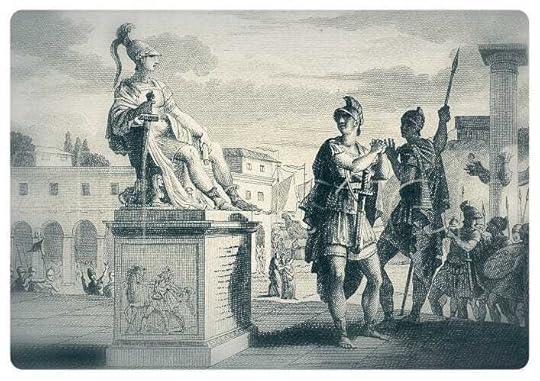 Caesar weeps at the statue of Alexander. Public domain.
Caesar weeps at the statue of Alexander. Public domain.However, Marcus doesn’t revere Alexander and seek to emulate or outdo his military achievements. Instead, he views him from the perspective of Stoic philosophy, with a greater degree of cynicism regarding his love of conquest. Contrast this with the stories about Marcus’ predecessor, Julius Caesar, reported by three Roman historians: Plutarch, Suetonius and Cassius Dio.
Dio says merely that when Caesar beheld a statue of Alexander, in the temple of Hercules, at Gades in Spain, “he had groaned aloud, lamenting that he had performed no great deed as yet.” With the detail in mind that Alexander died at the notoriously young age of thirty-two, Plutarch tells a slightly more elaborate version of the story:
[We are told that] in Spain, when he was at leisure and was reading from the history of Alexander, he was lost in thought for a long time, and then burst into tears. His friends were astonished, and asked the reason for his tears. “Do you not think,” said he, “it is matter for sorrow that while Alexander, at my age, was already king of so many peoples, I have as yet achieved no brilliant success?” — Plutarch, Life of Caesar
Suetonius likewise says that:
Noticing a statue of Alexander the Great in the temple of Hercules, he heaved a sigh, and as if out of patience with his own incapacity in having as yet done nothing noteworthy at a time of life when Alexander had already brought the world to his feet, he straightway asked for his discharge, to grasp the first opportunity for greater enterprises at Rome. — Suetonius, The Twelve Caesars
At one point, Marcus possibly implies that in addition to his philosophical notebooks he was writing a historical account of famous Greeks and Romans.
Run astray no longer; for you are not likely to read those notebooks of yours, or your accounts of the deeds of the ancient Romans and Greeks, or the extracts from their writings which you were laying aside for your old age. (3.14)
It may be that this would have focused on some of the historical figures he likes to mention in The Meditations, such as Alexander the Great. However, as we’ll see, Marcus’ appraisal of the deeds of these “ancient Romans and Greeks” would undoubtedly have criticized them, from the perspective of Stoic ethics.
Marcus on Caesar and AlexanderMarcus tends to lump Alexander together with Julius Caesar, and his rival Pompey the Great, as examples of famous military leaders, who are nevertheless viewed with disdain by philosophers. For instance, Marcus says that Alexander, like Julius Caesar and Pompey after him, “often razed whole cities to the ground and slaughtered tens of thousands of horsemen and foot-soldiers on the battlefield.” Nevertheless, he says, “there came a day when they too departed from this life” (3.3).
Indeed, “Alexander the Great and his stable boy were brought to the same level in death”, for they were either dissolved back into the soul of Zeus, or perhaps merely scattered alike among atoms (6.24). Either way, for the Stoics, they were both returned to the same state. The achievements of these rulers impress ordinary people but they’re of little importance in the grand scheme of things. Though remembered for many centuries, they will one day be forgotten.
Indeed, Marcus appears to have viewed Alexander’s legacy as short-lived. According to Herodian, another Roman historian:
This learned man [Marcus Aurelius] was disturbed also by the memory of those who had become sole rulers in their youth. […] The arrogance and violence of Alexander’s successors against their subject peoples had brought disgrace upon his empire.
“Go on, then, and talk to me of Alexander,” says Marcus, and of other celebrated rulers.
If they saw what universal nature wishes and trained themselves accordingly, I will follow them; but if they merely strutted around like stage heroes, no one has condemned me to imitate them. The work of philosophy is simple and modest; do not seduce me into vain ostentation. (9.29)
Marcus likes to remind himself that there’s nothing new under the sun and that the lives of great men like Alexander were essentially the same as other rulers throughout the centuries.
Constantly reflect on how all that comes about at present came about just the same in days gone by, and reflect that it will continue to do so in the future; and set before your eyes whole dramas and scenes ever alike in their nature which you have known from your own experience or the records of earlier ages… (10.27)
For example, he says, think of the entire court of Alexander, or the emperors Marcus knew such as Hadrian or his own adoptive father Antoninus — “in every case the play was the same, and only the actors were different.”
Wisdom is more important than glory. “What are Alexander, Julius Caesar, and Pompey when compared to Diogenes the Cynic, Heraclitus, and Socrates?”, asks Marcus (8.3). The philosophers, he says, were in control of their own minds. They understood all things properly, he says, distinguishing between “cause and matter”. He probably means, as we would say today, that the wise distinguish betweem concepts and the external events to which they refer — by closely observing their own thoughts and feelings.
“As to the others,” Marcus concludes, “consider how many cares they had and to how many things they were enslaved!” Although they were, in their times, the most powerful men in the world, Alexander, Caesar, and Pompey, were enslaved by their own passions, such as the craving for glory. They lacked insight into their own minds and therefore they lacked self-control. It was a familiar paradox of ancient philosophy that Diogenes the Cynic, a penniless exile, a beggar who died as a slave, could look upon Alexander the Great, the most powerful man in the world, as his equal, if not his inferior. Alexander had everything but he always wanted more. Diogenes had only what little would fit in his knapsack but he needed nothing, having mastered his own desires. Hence, the philosopher was, in Stoic terms, more powerful and more kingly even than the Lord of Asia.
June 9, 2025
Join my Stoicism AMA on Waking Up
I’m in Romania at the moment, speaking at a conference, but fly to Athens soon, where I’ll be answering questions about Stoicism, on Friday, from members of Sam Harris’ Waking Up community. I just had a quick look and there are already nearly 100 questions posted there in advance!

You’re invited to join us. The AMA (ask me anything) will take place here, and you’ll need to join the community first, although you can get a 30-day free trial subscription to do that if you’re not already a member.
To participate in the AMA, post your questions any time before the event as comments below, and Donald will reply to as many as he can during the event. We’ll be selecting five people who submit questions to receive a free copy of Donald’s newest book, How to Think Like Socrates.
You can also check out my Mindful Stoicism audio course on the app, and my recent interview with Sam Harris.
Stoicism: Philosophy as a Way of Life is a reader-supported publication. To receive new posts and support my work, consider becoming a free or paid subscriber.
If you’re not a Waking Up member already, use the link below to get a free trial.
I look forward to seeing you there on Friday, when I hope to answer as many questions as possible.
Thanks for reading Stoicism: Philosophy as a Way of Life! This post is public so feel free to share it.
June 5, 2025
The target was not set up in order to be missed...
CommentaryJust as a mark is not set up in order to be missed, so neither does the nature of evil arise in the universe.
The Stoics believed that the universe was created by Providence and that nothing in nature could therefore be evil when considered in relation to the whole because everything exists by the Will of God. Nothing Providence does is in error, so nothing that is part of the natural order can be evil. Epictetus here leaves open the question of how evil can arise in human nature. His point is that we should view events that befall us as God’s Will and therefore as incapable of being intrinsically bad. What matters is the use we make of events, for good or bad.
Let’s Compare Marcus Aurelius to Modern Psychotherapy
In this episode, I talk with Raymond DiGiuseppe, Professor of Psychology at St. John’s University and Director of Professional Education at the Albert Ellis Institute. Professor DiGiuseppe is a renowned figure in the field of cognitive-behavioral therapy, particularly Rational Emotive Behavior Therapy (REBT). He’s also done extensive work on anger. This is a special episode in which we take a deep dive into the Stoic anger management strategies described in the Meditations of Marcus Aurelius. How valuable are these ancient strategies when viewed from the perspective of modern evidence-based psychotherapy.

Stoicism: Philosophy as a Way of Life is a reader-supported publication. To receive new posts and support my work, consider becoming a free or paid subscriber.
HighlightsThe Stoic theory of anger as a “desire for revenge”
Avoid mind-reading: “[When getting offended:] remember that you can’t be sure that they are doing wrong, because many actions serve some other purpose. Generally speaking, a great deal of experience is needed before one can confidently express an opinion about what someone else is doing.”
Consider the whole character: “Remember how they behave while eating, while reclining on their couches, and so on, and most importantly how their beliefs leave them no choice, and how they pride themselves on what they do.”
Attribute actions to ignorance rather than malice: “For no soul is voluntarily deprived of the truth and by the same token no soul is voluntarily deprived of the ability to [judge the worth of things properly]. Indeed, people don’t like to be called unjust, discourteous, and avaricious, or, in general, to be thought of as someone likely to wrong their neighbors.”
Contemplate impermanence: “When you’re too angry or impatient, remember that human life is fleeting and before long all of us will have been laid to rest.”
Cognitive distancing: “Remember that it is not people’s actions that disturb us (because their actions are [their own business]), but our opinions of their actions. At any rate, eliminate the judgment that they’re doing something hurtful, and be willing to let go of it, and anger comes to an end.”
Anger does us more harm than the things we’re angry about: “Remember that we suffer more from getting angry and upset about such things than we do from the things themselves.”
Kindness and other virtues can replace anger: “Remember that kindness is unconquerable if it’s genuine, not phony or feigned. After all, what can even the most abusive person in the world do to you if you keep on being kind to him and, if the opportunity arises, gently offer him advice and take the time to show him the error of his ways right when he’s trying to do you harm?”
Recognize your own flaws: “Remember that you yourself often do wrong and are no better than them. Even if you refrain from certain kinds of transgressions, you still have the capacity to commit them.”
Do not demand perfection from others: “[And you can accept a tenth gift, from Apollo, the Leader of the Muses:] the proposition that it’s insanity to expect flawed men never to do wrong, because that would be desiring the impossible..”
Remember, nature gave you the potential to overcome anger and conflict: “First, remember the various kinds of relationship I have with [others]: we were born to help one another.”
Are there other relevant attitudes that Marcus Aurelius doesn’t mention?
LinksProfile at St John’s University
Profile at the Albert Ellis Institute
Thanks for reading Stoicism: Philosophy as a Way of Life! This post is public so feel free to share it.
May 29, 2025
Check out My Conversation with Sam Harris
This currently requires a subscription but if you’re on Substack, you might be interested in checking out my conversation with below. The episode is available on the Waking Up app, along with my audio course on Stoicism. (Free trials are available.) Stay tuned for news of my forthcoming AMA on Waking Up.
Claim your Free Trial of Waking Up
 Sam Harris Making Sense #417 - Philosophy for LifeSam Harris speaks with Donald Robertson about Stoicism and the good life. They discuss the relationship between wisdom and virtue, ancient versions of psychotherapy, parallels between Stoicism and Buddhism, practical vs. analytical styles of philosophy, CBT’s origins in Stoicism, the difficulty of self-criticism, techniques for reframing upsetting exper… Listen now21 hours ago · 49 likes · 6 comments · Sam Harris
Sam Harris Making Sense #417 - Philosophy for LifeSam Harris speaks with Donald Robertson about Stoicism and the good life. They discuss the relationship between wisdom and virtue, ancient versions of psychotherapy, parallels between Stoicism and Buddhism, practical vs. analytical styles of philosophy, CBT’s origins in Stoicism, the difficulty of self-criticism, techniques for reframing upsetting exper… Listen now21 hours ago · 49 likes · 6 comments · Sam Harris

Stoicism: Philosophy as a Way of Life is a reader-supported publication. To receive new posts and support my work, consider becoming a free or paid subscriber.
Thanks for reading Stoicism: Philosophy as a Way of Life! This post is public so feel free to share it.
Medicine for the Mind: Donald Robertson on Ancient Therapies for Modern Stressors
A while back I was interviewed by Larry Weeks for his Bounce podcast. You can listen to the episode on his website, on Spotify, or Apple podcasts.

Stoicism: Philosophy as a Way of Life is a reader-supported publication. To receive new posts and support my work, consider becoming a free or paid subscriber.
Larry says…We explore many of the tools and exercises Stoicism offers for emotional regulation and resilience, and examine the idea that the early Stoics were the first psychotherapists. Donald explains Stoicism contained a clear system of therapy in ancient Greek and Roman thought.
The episode covers a ton of ground, including:
How shifting definitions shape our understanding of mental illness
On the paradox of growth through adversity
Struggle and transformation
Experiential wisdom
Fortune and the bitch goddess of success
Stoicism as an ancient psychotherapy
The philosophical roots of cognitive therapy
On anger, and the art of self-mastery (Seneca, Galen)
Worry and rumination
How Marcus Aurelius aggregated tools for resilience
Stoicism’s broader vision
On the “view from above” and the liberation of perspective
How time expansion mitigates worry
The complex relationship of thoughts and emotions
The core proposition
Why unproductive complaining signals resistance to reality
Acceptance and the dichotomy of control
How to reconnect with what’s essential in a noisy world
This is deeply practical. This isn’t motivational fluff; it’s a toolkit for anyone who’s ever gotten tangled in their own head.
Thanks for reading Stoicism: Philosophy as a Way of Life! This post is public so feel free to share it.
May 27, 2025
The Most Profound Saying About Anger?
In a collection of fragments from ancient philosophers and poets, known as the Anthology of Joannes Stobaeus, there’s a section titled On Anger. It opens with a quote attributed to the poet Theognis, which may be one of the most profound sayings I’ve ever come across on this topic.
Nothing, Cyrnus, is more unjust than anger, which harms the one who possesses it, yielding to cowardly things through indignation.
For reference, here is the original Greek:
Οὐδέν, Κύρν᾽, ὀργῆς ἀδικώτερον, ἣ τὸν ἔχοντα πημαίνει, θυμῷ δειλὰ χαριζομένη.
[More literally: “Nothing, O Cyrnus, (is) more unjust than anger, (which) harms the (one) possessing (it), (anger itself) granting cowardly/wretched things as a favor/indulgence to (its) spirit/preceding passion.”]
Cyrnus is thought to have been the lover of Theognis, to whom his verses are addressed. (Some Greek manuscripts substituted the phrase “O stranger”.) This single line of elegiac verse contains three paradoxes regarding anger, which I’ll analyze in turn.
 Photo by Khashayar Kouchpeydeh on Unsplash
Photo by Khashayar Kouchpeydeh on UnsplashStoicism: Philosophy as a Way of Life is a reader-supported publication. To receive new posts and support my work, consider becoming a free or paid subscriber.
1. Nothing is More Unjust than AngerThis means that anger is inherently hypocritical. Anger toward other people, especially in ancient thought, was typically understood as a desire for revenge in response to a perceived injustice. If anger itself is always more unjust than the perceived injustices which anger us, that is a moral contradiction. How is it possible, though, that anger could be so unjust?
Anger clouds our judgment. Nobody would expect a fair trial from a judge and jury who are enraged. Indeed, numerous modern studies provide evidence that even low intensity anger is associated with a battery of cognitive biases. In particular, angry people tend to exhibit various forms of selective thinking and confirmation bias. For instance, anger is associated with hostile attribution bias, which reduces the motivation of others to mere hostility or malice, and ignores other plausible explanations for their actions. Angry people show a negative interpretation bias, immediately construing ambiguous behaviour in the worst possible light. Angry people also tend to exhibit dichotomous (black-and-white) thinking, which leads them to divide people sharply into friends and enemies. This creates a form of extreme thinking because different expectations are applied to friends and enemies. Worse, anger almost invariably leads to the sort of rigid thinking that is convinced its actions are righteous and justified, even when they seem clearly unjust to observers.
In other words, anger, by its very nature, tends to lead to a pronounced double standard in our moral thinking. Most obviously, though we tend to apply rigid demands (“People must respect me”) to others we usually bend the rules, and make an exception to our strictness, by applying a more flexible standard that excuses our own behaviour or that of people with whom we choose to side. “Well”, we say, “people mean different things by ‘respect’ and, anyway, what one person sees as disrespectful might not have been intended that way by the person with whom they’re angry.” That’s special pleading — we act as though different rules apply when it feels as if it’s in our interests to do so. As Seneca puts it, “The sword of justice is ill-placed in the hands of an angry man” (On Anger, 1.19).
2. Anger Harms its PossessorWhen we are angry, we typically feel a wish to harm the person with whom we’re angry. We may lash out physically or try to humiliate them verbally. We do this either to defend ourselves against a perceived threat or to punish the other for their perceived wrongdoing. However, it’s actually more common in our society for us to internalize our anger, and try to suppress our feelings, or ruminate about fantasies of revenge. Anger causes our blood pressure to increase more quickly and powerfully than anxiety and, as a result, chronic anger has consistently been found to correlate with health problems such as hypertension and heart disease. Anger can also lead to interpersonal problems. For instance, it may damage or destroy relationships in the workplace, or at home, between family members.
The Stoics actually go slightly further than this line of poetry and assert not only that anger harms its possessor but that it always does us more harm than the thing about which we’re angry. Other people may harm our property or reputation but they cannot injure our character unless we allow them to do so. By contrast, anger penetrates to the very core of our being, by clouding our judgment, and directly harming our ability to reason. For that reason, anger actually does us more harm, and therefore poses a greater threat to us, than anything about which we may be angry.
3. Anger Yields to Cowardly IndignationThis part of the saying requires a little more effort to unpack. The first thing to note is that a different aspect of anger has been introduced, not orge, the typical word, but thumos, which usually refers to a more primitive and instinctual feeling. I have used the word “indignation” to express this notion. In Platonism, thumos was an important term, defined as a:
forceful impulse of the non-rational part of the soul, without being ordered by reasoning and thought. — Pseudo-Plato, Definitions
In Stoic philosophy, thumos is defined as the first spark or precursor of true anger, although the Stoics did believe it was already cognitive in nature, or “ordered by thought”, to some extent. In either case, it’s a primitive emotional reaction. So it would make perfect sense here to describe full-blown anger (orge) as arising when reason yields to incipient anger (thumos).
The word translated here as “yielding” literally means doing favours for someone or, if you like, indulging them. Full-blown anger develops when we allow ourselves to indulge in our initial automatic flash of anger, and go along with the feeling, without questioning it. This initial reaction is described as “cowardly” or “wretched”. That language implies that the precursor of anger is actually a form of fear or anxiety, based on the perception that one faces a threat or has already been harmed.
This would be consistent with modern psychological research on anger, which suggests that it is often a response to a preceding feeling of hurt or anxiety. Anger consists in going along with the impression that you have been hurt or that someone threatens to harm you, or your interests. The Stoics believe that this is an error, however, on the part of the angry person. Our anger is based on a false premise because nobody, according to the Stoics, can truly harm you unless you allow them to do so. Many people in the ancient world believed that anger was a sign of strength or courage, and some people share this assumption even today. However, ironically, if anger derives from an earlier irrational fear or sense of hurt then it is, in a sense, evidence not of strength but of weakness. Anger is a form of “magical thinking”, or self-deception, that attempts to cover up our initial sense of helplessness and vulnerability. The angry person not only feels hurt but indulges in that feeling whereas a wise and temperate individual would consider the initial impression that they have been hurt to be misleading, an illusion of sorts. As the Stoics like to say, we should withhold our assent from the initial troubling impression.
ConclusionI think that Stobaeus chose to open his collection of quotes on anger with this line because it manages to condense three very powerful philosophical observations:
Nothing, Cyrnus,
is more unjust than anger,
which harms the one who possesses it,
yielding to cowardly things through indignation.
Anger, which rages at the injustice of others, is itself profoundly unjust by nature, and a poor judge and jury. Though anger may desire payback, to return pain for pain, it often inflicts far more harm upon its own bearer than the things about which they’re enraged. And though it may make us feel temporarily powerful, anger is not strength, but weakness, because it only gains intensity by building upon our underlying sense of fear and vulnerability.
Thanks for reading Stoicism: Philosophy as a Way of Life! This post is public so feel free to share it.
May 15, 2025
Listen to my Conversation with Sam Harris
I recently spoke with Sam Harris about the parallels between Stoicism and Buddhism, and how Stoic techniques can be compared to mindfulness practices. You can listen to the podcast episode on the Waking Up app. If you’re not already subscribed, you can get a free 30 day trial of the app by following this link.
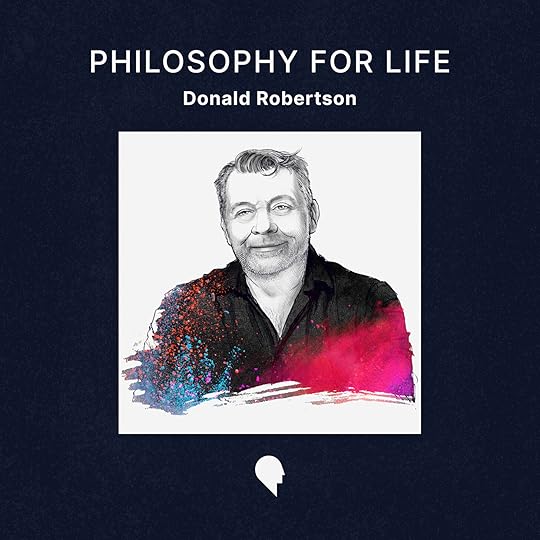
You’ll also find my whole Mindful Stoicism audio course on the app, consisting of sixteen sessions, spanning more than three hours.
Author and psychotherapist Donald Robertson mixes Stoic philosophy, modern psychology, and vivid historical anecdotes. The potent combination helps us challenge our limiting beliefs, clarify our core values, and find fulfillment in even our most difficult experiences.
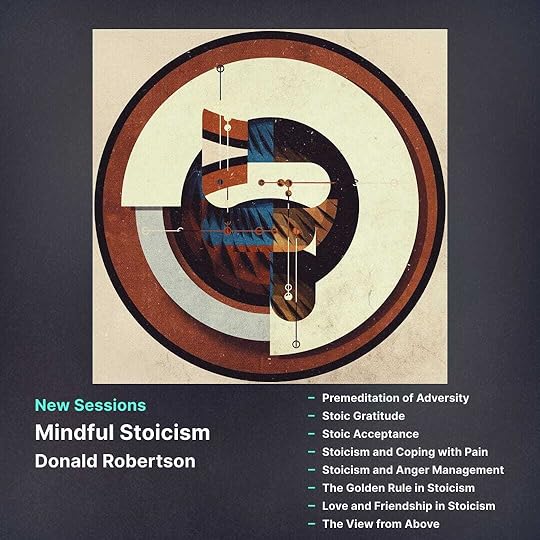
Stoicism: Philosophy as a Way of Life is a reader-supported publication. To receive new posts and support my work, consider becoming a free or paid subscriber.
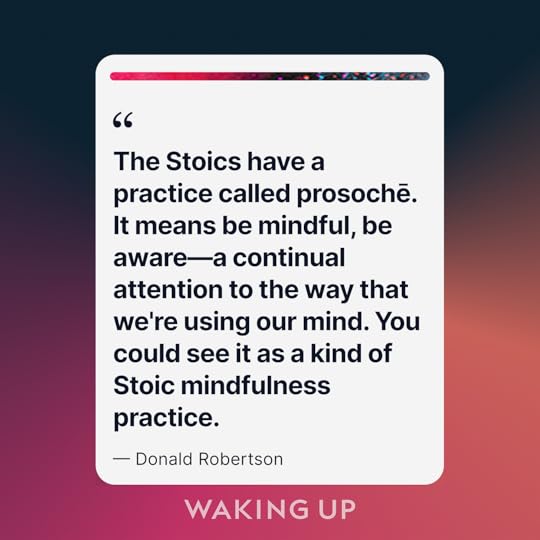
Thanks for reading Stoicism: Philosophy as a Way of Life! This post is public so feel free to share it.



